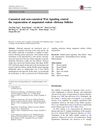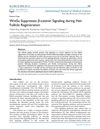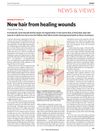October 2022 in “International Journal of Molecular Sciences” Fish collagen peptides can significantly promote hair growth.
 85 citations,
April 2012 in “PLOS ONE”
85 citations,
April 2012 in “PLOS ONE” Valproic Acid helps regrow hair in mice and activates a hair growth marker in human cells.
 8 citations,
January 2017 in “Stem Cells International”
8 citations,
January 2017 in “Stem Cells International” A protein called sFRP4 from skin cells stops the development of pigment-producing cells in hair.
 February 2024 in “Journal of Dermatological Science”
February 2024 in “Journal of Dermatological Science” Curved hair can develop when hair cells merge abnormally during growth.
 155 citations,
August 2003 in “Journal Of Experimental Zoology Part B: Molecular And Developmental Evolution”
155 citations,
August 2003 in “Journal Of Experimental Zoology Part B: Molecular And Developmental Evolution” Understanding hair growth involves complex interactions between molecules and could help treat hair disorders.
 43 citations,
September 2017 in “Lasers in Surgery and Medicine”
43 citations,
September 2017 in “Lasers in Surgery and Medicine” LED light therapy may help hair growth by activating certain cell pathways.
 October 2023 in “Current Issues in Molecular Biology”
October 2023 in “Current Issues in Molecular Biology” The YH complex, made from Astragalus membranaceus and Cinnamomum cassia, may help treat hair loss by promoting hair growth and follicle development.
 140 citations,
November 2018 in “Pharmacology & Therapeutics”
140 citations,
November 2018 in “Pharmacology & Therapeutics” Using drugs to activate the Wnt/β-catenin pathway has potential for treating diseases but also presents challenges.
November 2024 in “European Journal of Pharmacology” MitoQ may help treat hair loss by boosting hair growth pathways.
 19 citations,
February 2018 in “Lasers in Medical Science”
19 citations,
February 2018 in “Lasers in Medical Science” Red light and LED treatments help hair grow by activating a specific cell signaling pathway.
March 2023 in “International Journal of Molecular Sciences” ADSC-Exos with miR-122-5p can help treat hair loss by promoting hair growth.
 74 citations,
September 2006 in “Cell Cycle”
74 citations,
September 2006 in “Cell Cycle” The HR protein's role as a repressor is essential for controlling hair growth.
43 citations,
January 2016 in “Cellular physiology and biochemistry” Epidermal Growth Factor helps hair follicle cells grow and move by activating a specific cell signaling pathway.
 5 citations,
January 2016 in “Journal of Molecular Histology”
5 citations,
January 2016 in “Journal of Molecular Histology” Both main and alternative Wnt signaling are important for regrowing rodent whisker follicles.
 489 citations,
November 2021 in “Signal Transduction and Targeted Therapy”
489 citations,
November 2021 in “Signal Transduction and Targeted Therapy” The JAK/STAT pathway is important in cell processes and disease, and JAK inhibitors are promising for treating related conditions.
 17 citations,
May 2018 in “PeerJ”
17 citations,
May 2018 in “PeerJ” VB-1, a natural compound, may promote hair growth by enhancing a key cell growth pathway.
 39 citations,
January 2013 in “Journal of Investigative Dermatology”
39 citations,
January 2013 in “Journal of Investigative Dermatology” Changing Wnt signaling can lead to more or less hair growth and might help treat hair loss and skin conditions.
 6 citations,
July 2017 in “Biochemical and Biophysical Research Communications”
6 citations,
July 2017 in “Biochemical and Biophysical Research Communications” The Hairless gene is crucial for hair cell development, affecting whether skin cells become hair or skin and oil gland cells.
 19 citations,
May 2020 in “Cells”
19 citations,
May 2020 in “Cells” Substance from human umbilical cord blood cells promotes hair growth.
 7 citations,
January 2017 in “Biological & Pharmaceutical Bulletin”
7 citations,
January 2017 in “Biological & Pharmaceutical Bulletin” Certain compounds from Panax ginseng can block proteins that affect hair growth, potentially helping treat hair loss.
July 2024 in “International Journal of Molecular Sciences” The inhibitor DPP can promote hair growth.
10 citations,
October 2021 in “Animal nutrition” Vitamin B6 helps increase hair growth and density in rabbits by affecting certain cell signaling pathways.
 May 2024 in “Cell proliferation”
May 2024 in “Cell proliferation” Melatonin helps hair grow by activating a specific signaling pathway.
 16 citations,
January 2016 in “International Journal of Medical Sciences”
16 citations,
January 2016 in “International Journal of Medical Sciences” Wnt5a slows down hair growth by blocking a specific pathway during hair regeneration.
4 citations,
May 2022 in “PeerJ” Melatonin may help hair growth by affecting cell growth and hair-related signaling pathways.
2 citations,
November 2022 in “Oxidative Medicine and Cellular Longevity” Exosomes from dermal papilla cells help hair follicle stem cells grow and survive.
 August 2020 in “Research Square (Research Square)”
August 2020 in “Research Square (Research Square)” Neural progenitor cell-derived nanovesicles help hair growth by activating a key signaling pathway.
 77 citations,
July 2012 in “Journal of Investigative Dermatology”
77 citations,
July 2012 in “Journal of Investigative Dermatology” Wnt10b overexpression can regenerate hair follicles, possibly helping treat hair loss and alopecia.
 57 citations,
May 2007 in “Nature”
57 citations,
May 2007 in “Nature” Adult mice can grow new hair from skin wounds.
 43 citations,
December 2013 in “Seminars in Cell & Developmental Biology”
43 citations,
December 2013 in “Seminars in Cell & Developmental Biology” Genetic mutations can cause hair growth disorders by affecting key genes and signaling pathways.





















